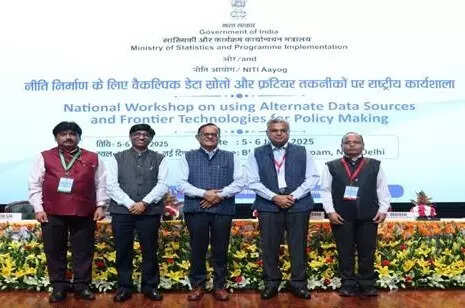
NEW DELHI: The Ministry of Statistics and Programme Implementation (MoSPI), in collaboration with NITI Aayog and the World Bank as knowledge partner, successfully hosted a two-day National Workshop on ‘Using Alternate Data Sources and Frontier Technologies for Policy Making’ at Bharat Mandapam, New Delhi on June 5–6, 2025. The event brought together over 450 participants, including government officials, statisticians, industry leaders, researchers, and representatives from multilateral organisations.The workshop focused on leveraging non-traditional data sources, including mobile phone records, scanner data, and geospatial intelligence, alongside emerging technologies like artificial intelligence and machine learning, to improve the agility, accuracy, and timeliness of public policy and governance.
Delivering the valedictory address, Prof. Ajay Kumar Sood, Principal Scientific Advisor to the Government of India, said:
“While traditional data tells us where we’ve been, alternate data reveals where we are headed. The best policies blend both for a comprehensive and real-time understanding. Ethical deployment of AI and a techno-legal framework for data governance are essential as India pioneers digital public infrastructure for the world.”
Prof. Abhay Karandikar, Secretary, Department of Science and Technology, underscored the complexity of policymaking in today’s data-rich world. He emphasized the need for an institutionalized hybrid data ecosystem where alternate sources are given equal weight alongside established methods like surveys and censuses.
Dr. Saurabh Garg, Secretary, MoSPI, said that traditional survey data often comes with a time lag, and alternate data sources can bridge this gap for real-time policy interventions. He outlined MoSPI’s plan to operationalize select use cases within the next 3–6 months and reaffirmed the ministry’s commitment to building a robust, cost-effective, and inclusive statistical system.
In his welcome remarks, PR Meshram, Director General (Data Governance), highlighted that the workshop deepened understanding of the challenges and solutions involved in integrating alternate data sources into India’s statistical framework.
Key Technical Sessions and Insights
AI and Data Science for Official Statistics
Discussions focused on transitioning from pilot projects to production-stage applications of AI in public data systems. Speakers included Abhishek Singh (India AI), Debjani Ghosh (NASSCOM), and global experts from the UK ONS and World Bank.
Mobile Phone Data for Tourism Statistics
Experts explored frameworks for using anonymized telecom data to estimate tourist flows and urban mobility, while addressing privacy and regulatory concerns. Speakers included officials from ITU, NDMA, and industry leaders such as Airtel.
Geo-Spatial Data for Sampling and Ocean Accounting
This session showcased how geospatial tools combined with AI can revolutionize sampling in urban areas, environmental monitoring, and marine resource management. Speakers included experts from ESRI, MapMyIndia, INCOIS, and World Bank.
Scanner Data for CPI Compilation
The session focused on integrating scanner and e-commerce data into Consumer Price Index (CPI) methodologies. International experts from Bank of Italy, JNU, IIT Bombay, and NielsenIQ shared best practices and implementation strategies.
The workshop concluded with a vote of thanks by Dr. Ashutosh Ojha, Deputy Director General, MoSPI, who acknowledged the active participation of government departments, industry, academia, and international organisations. He expressed hope that the insights from the workshop would guide India’s efforts to become a global leader in statistical innovation and evidence-based policy design.


